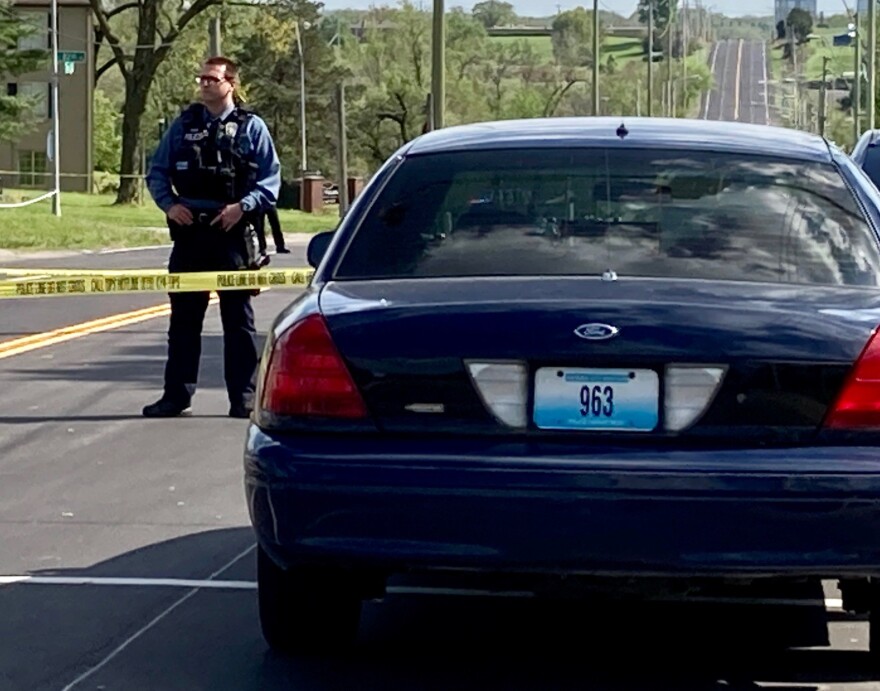As Kansas City continues to grapple with high rates of homicides and gun violence, a new city program aims to intervene — and interrupt — incidents of violence before they happen.
Called Violence Interrupters, the program draws in leaders from City Hall, the Kansas City Police Department, the Jackson County Prosecutor’s Office, the Department of Corrections, local hospitals and more than 30 social service organizations in the Kansas City area.
Violence Interrupters uses a “focused deterrence” model for crime prevention: identifying individuals who are victims and perpetrators of violent crime, or have a history of involvement with violent crime, and connecting them with social services, in the hopes of interrupting the cycle of violence.
“How do you get to the root causes of crime? You don't lock people up because we know that doesn't work. You don't oversaturate the urban core in the inner city with police officers, because we know that doesn't work,” said Melesa Johnson, deputy chief of staff to Kansas City Mayor Quinton Lucas and a member of the Violence Interrupters program. “You provide social services, like job training, education, child care classes, parenting classes, conflict resolution classes, behavioral health management, mental health management.”
The initiative is the brainchild of a group of city leaders, including the mayor’s office, the KCPD, the Jackson County Prosecutor’s Office and local advocacy groups like the Urban League of Greater Kansas City. The group developed the idea through a program between Bloomberg Philanthropies and Harvard University that focuses on how city leaders can solve local problems.
The new program follows years of rising homicide numbers in Kansas City. Already, the city is on track to surpass its number of homicides last year: 99 compared with 97 at the same time in 2021.
The common response to rising crime has been to shovel more money to police departments. But Johnson said that has not solved the problem.
That’s the reason Violence Interrupters involves more than just local law enforcement and brings social service organizations into the fold.
“We know that every non-fatal shooting is just simply a failed homicide and that kind of creates space for there to be potential retaliation,” Johnson said.
How will it work?
To identify individuals eligible for the program, Violence Interrupters will secure referrals from five sources through weekly meetings.
One of them is the KCPD’s weekly shoot review, which analyzes recent homicides and nonfatal shootings. Another is a custom notification system established by the KCPD and the prosecutor’s office to visit the homes of people engaged in criminal activity and give them the option to connect with social services. Yet others include trauma hospitals that treat shooting victims, probation and parole programs, and the corrections department.
Interim KCPD Chief Joseph Mabin has been conducting one-on-one visits with the prosecutor on a weekly basis.
“We might get a concerned family member — a mom, uncle, whoever — and we'll deliver the message to them and say, ‘Hey, your son, your nephew, whoever, is on our radar, please deliver this message to them that we have resources, but the community's not going to stand for violence anymore,’” Mabin said at a recent meeting of the Violence Interrupters governing board.
Jackson County Prosecutor Jean Peters Baker echoed what Mabin said.
“If we can stop a bad event from occurring, that's the real prize if we can do that,” she said at the meeting.
People referred to Violence Interrupters must agree to participate and to identify their needs, whether it’s access to a job or mental health services. Some of the participating organizations include groups that work with unhoused people such as reStart, and city organizations such as Aim 4 Peace, which takes a public health approach to reducing gun violence.
“We have all of these different organizations coming together and we're literally going to go line by line: ‘Okay, this person was brought up during shoot review. They have reported that they need education and job training. Who has the capacity to meet that need?’” Johnson said.
As the program gears up, Johnson said the group will track how many people participate in the program and their recidivism rates.
NoVa lessons
Violence Interrupters is not the city’s first crime prevention program. In 2013, the No Violence Alliance, or NoVa, was established to curb violent crime through a similar focused deterrence model of conducting “call-ins,” whereby law enforcement identified a total of about 1,100 violent offenders and their associates. Law enforcement then held meetings with offenders in a public space like a church.
NoVa combined focused deterrence and discipline. At call-ins, law enforcement would threaten prosecution if attendees continued to engage in violence. But if they stopped, NoVa would connect them with services to help them.
Johnson, who was working in the Jackson County Prosecutor’s office at the time, said that aspect of the program caused concern among community members.
“It cast a very, very wide net and essentially threatened people with criminal charges if they did not engage in social services,” she said. “And so you were threatening people that may not have even really been involved in violence.”
Still, NoVa appeared to be successful in its goal of reducing crime: In 2014, Kansas City saw a historic drop in homicides, to 86, that it had not witnessed in decades. But homicides spiked again in 2015 and by 2019, the KCPD, under former Chief Rick Smith, stopped referring people to the program, opting instead for different crime fighting strategies.






